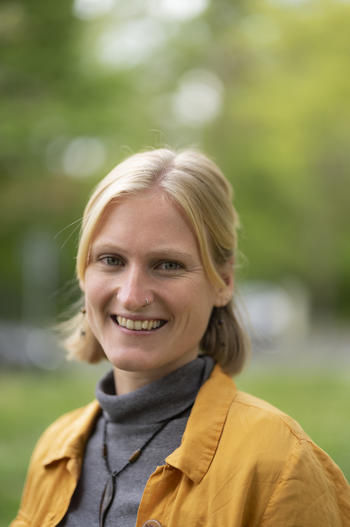Eva Kirmes

International Research Training Group 'Temporalities of Future in Latin America'
PhD Candidate
Anthropology
Project: "Aspirations for socio-ecological transformation – Indigenous women’s collective action for food sovereignty and anticipation of climate change"
14195 Berlin
Education
|
Since 05/2022 |
PhD Candidate, International Research Training Group “Temporalities of Future”, Freie Universität Berlin |
|
01/2021 – 12/2021 |
Postgraduate Program, International Cooperation for Sustainable Development, Centre for Rural Development (SLE), Humboldt-Universität zu Berlin |
|
10/2018 – 09/2020 |
Master of Arts in Interdisciplinary Latin American Studies, Freie Universität Berlin |
|
10/2014 – 09/2018 |
Bachelor of Arts in Social and Cultural Anthropology, Portuguese, Latin American Studies, Freie Universität Berlin |
Work Experience
|
Since 05/2022 |
Researcher, International Research Training Group “Temporalities of Future”, Freie Universität Berlin |
|
06/2021 – 12/2021 |
Member of Research Project “The value(s) of food – Promoting sustainable agricultural value chains. Case studies from the potato & fish value chains in Uganda” Centre for Rural Development (SLE), Humboldt-Universität zu Berlin |
|
10/2020 – 01/2021 |
Intern at Stiftung Nord-Süd-Brücken, Berlin |
|
03/2019 – 04/2021 |
Student Assistant in the Area of Anthropology, Institute for Latin American Studies (Prof. Dr. Stephanie Schütze), Freie Universität Berlin |
|
04/2018 – 06/2018 |
Intern at Friedrich-Ebert-Stiftung – Country Office Bolivia, La Paz |
|
03/2017 – 07/2017 |
Intern at Asplande (Assessoria e Planejamento para o Desenvolvimento), Rio de Janeiro |
|
08/2016 – 10/2016 |
Intern at Ibero-Amerikanisches Institut, Berlin |
|
03/2016 – 12/2017 |
Student Assistant at the DFG-funded Research Project “Governance in Areas of Limited Statehood”, SFB 700, Freie Universität Berlin |
Project: "Aspirations for socio-ecological transformation – Indigenous women’s collective action for food sovereignty and anticipation of climate change"
Supervisor:
Prof. Dr. Stephanie Schütze, Freie Universität Berlin
This research examines the role of Quechua women’s collectives as protagonists of socio-ecological transformation. My scientific interest stems from the aspect of women being disproportionately affected by climate change, especially through their often attributed role as providers of food. In addition, food is increasingly subject to speculation and is characterized by unequal power relations, which in turn have a particularly strong impact on farmers. Against this background, I would like to shed light on processes of collective action for food sovereignty and the related adaptation to climate change by understanding collective action as an interface between ecological, social and political demands.
Since the question of transformation is inseparable from a temporal component and indigenous perspectives are underrepresented, especially in terms of identifying future options for action, I focus the research on perspectives on the future and their interconnectedness with present collective organization: To what extent does a notion of the future shape collective action, and how does collective action in the present construct a particular vision of the future? By applying a combined framework of feminist political ecology and anticipatory anthropology to the data collected from participatory field research and participant observation in the southeastern Peruvian Andes, the study seeks to highlight notions of future aspirations and contribute to the visualization of gendered indigenous approaches to collective action for food sovereignty.
Articles
Hänke, H., & Wesana, J., & Ahmed, J., & Eichelter, L., & Ekyaligonza, D., & Hegeler, F., & Kataike, J., & Kirmes, E., & Kisakye, V., & Lauben, M., & Mara, F., & Mbabazi, S., & Mutambo, S. (2022). Sustainability Hotspot Analysis 2.0. A participatory approach to assess the Nile perch and Irish potato value chains in Uganda. 10.18452/24379.
Kirmes, E. (2020). Empowerment von Unternehmerinnen und Praktiken des Netzwerkens. Eine ethnographische Studie am Beispiel der Frauenorganisation Asplande in Rio de Janeiro/Brasilien. Berlin: Freie Universität Berlin. Retrieved from http://dx.doi.org/10.17169/refubium-34511


